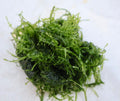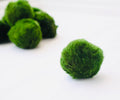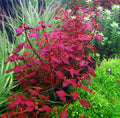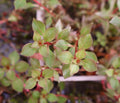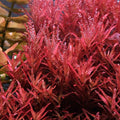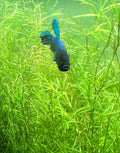10 Myths About Shrimpkeeping
MYTH: Fishkeeping is much easier than shrimpkeeping.
Keeping shrimp is not more difficult than keeping fish. Simply put, there are different considerations for shrimp than for fish. All you need is a fundamental grasp of concepts related to water parameters. Since shrimp are simple organisms with basic requirements, they will flourish if those needs are met.
MYTH: Shrimp will take care of my algae issue.
Shrimp are excellent algae eaters—it's true! Check out our experiment where we ate algae. Shrimp will significantly reduce your algae issue since they eat the majority of soft algae species. Having said that, they are not the perfect solution for your aquarium's algae problem. Your issue will be resolved more quickly than shrimp can consume it with the proper balancing of water conditions, illumination, and CO2.
MYTH (kind of): Shrimp and bettas may coexist without risk.
Probably the most frequent question we get is this one. Perhaps the best response to this question is "maybe." Every Betta has a unique personality, quite similar to a human's. Your Betta may not even glance at the shrimp for weeks or months after being introduced to a tank containing shrimp, or vice versa. Then one day all of your shrimp disappear, and Mr. Betta is left alone in a tank.
"If it's tiny enough to fit in its mouth, it probably will end up there," is the greatest adage to remember while keeping fish and shrimp together.
MYTH (kind of): Aquarium assassin snails will kill shrimp.
Shrimp won't often be harmed by assassin snails. If not given adequate food supplies, they will turn to hunt and devouring our shrimp as a means of getting by. Having said that, mixing shrimp and assassin snails in a well-maintained home aquarium is entirely acceptable and even encouraged by us at The Shrimp Farm.
MYTH (kind of): My shrimp will be eaten by planaria.
Planaria are, to put it mildly, disgusting. Just thinking about them sends chills up my spine. They are not a danger to bigger adult or sub-adult shrimp, despite being known to attack or consume little shrimp or shrimplets. Immediately get rid of them if you're breeding. They often show up when you overeat.
MYTH: Shrimp needs a Java Moss plant to reproduce.
Although having moss and other aquatic plants is advantageous, they are not necessary. In tanks without plants, we have successfully raised shrimp several times. Some varieties of shrimp may be found in the wild in areas with little or no plant life.
MYTH: Eggs are deposited by shrimp.
On the surface or the substrate, shrimp will not deposit their eggs. Until they hatch, the eggs will be carried by the female. The shrimplets, or larvae, will live a life of their own after hatching. The female takes care of and cleans the eggs.
MYTH Dwarf shrimp will not devour their young shrimps. Shrimp consume their young. Both adults and shrimplets may be grown in the same aquarium since the female carries the eggs until they hatch.
MYTH: Dwarf shrimp do not need daily feeding.
I must feed my shrimp every day. Supplemental feedings are beneficial, however, overfeeding often contributes significantly to a drop in mobility, breeding, and sometimes even mortality. It is advised to feed every other person every third day. If you feed in the proper quantities based on the size of your colonies, feeding may be done every day.
MYTH: CO2 causes harm to shrimp.
Shrimps in an aquarium are not harmed by CO2. Like all living things, shrimp need oxygen to survive. The shrimp won't be harmed by a CO2 injection into your planted aquarium. On the other side, having too much CO2 and insufficient oxygen may kill your shrimp. To improve shrimp breeding, foreign breeders often take advantage of CO2's capacity to reduce the pH of the water.
For the recommended pH range for each shrimp, see the individual shrimp's information page. To claim that it is dangerous if shrimp breeders at sea are doing it is absurd. That being stated while utilizing CO2 in the shrimp tank, significant pH fluctuations are often to blame for shrimp mortality.
MYTH: Shrimp must be dosed with iodine to remain alive.
Maintaining the health of your shrimp tank does not at all require iodine. Dosing often does more damage than good, and giving your shrimp colony too much might cause it to die. Iodine dosage, when carried out properly, is not a "bad thing" and may even be advantageous.
Know of any other popular myths? Please let us know in the comments so that we can respond and include it on the list!



